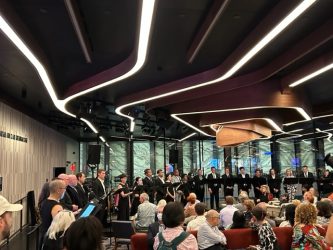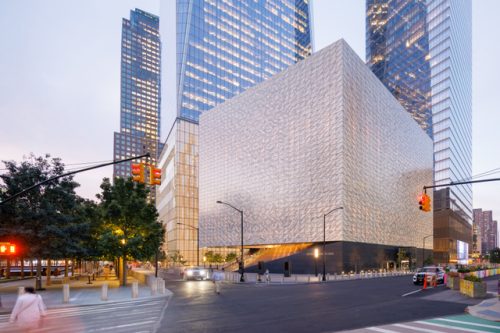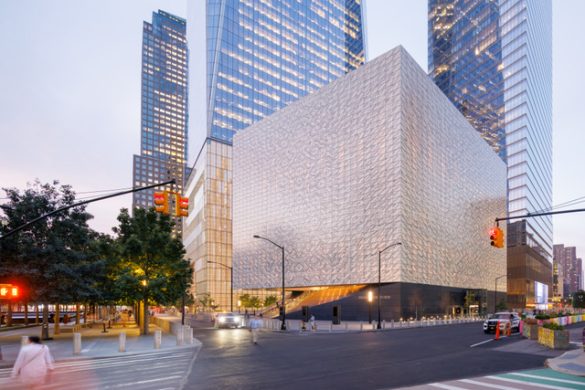 United States Various, ‘Devotion: Faith as Refuge’: Perelman Performing Arts Center, New York, 20.9.2023. (RP)
United States Various, ‘Devotion: Faith as Refuge’: Perelman Performing Arts Center, New York, 20.9.2023. (RP)

I walked through the World Trade Center Plaza regularly on my way to work prior to 9/11, as my office was a few blocks away. Back at work a week after 9/11, I and so many others would regularly gaze upon the spot where the Twin Towers once stood. It was all but impossible to avert your eyes from it once you were outdoors. A steady westerly wind meant that we did not smell fresh air until the end of November 2001.
The WTC is now almost unrecognizable to me, never more than this week and wondrously so. Something we could not imagine then and which many thought implausible has now opened just steps away from the footprint of the Twin Towers, a cultural component to memorials, museums, transit hubs and office towers.
The Perelman Performing Arts Center is a tribute to the resilience of a city that can dream big and deliver. PAC NYC’s mission is even more ambitious: to become a space of both welcome and solace that is community-centered yet international, a home for a diverse and inclusive artistic community with programing that will draw people together.

PAC NYC opened with ‘Refuge: A Concert Series to Welcome the World’ on 19 September. For five consecutive evenings, a multitude of musical experiences explored a different facet of Refuge – Home, Faith, School, Family and Memory. Musicians performed in free concerts open to the public and in ticketed events in its theaters. Admission for the latter was pay-what-you-wish, ranging from $15 to $120 per ticket.
The second event, ‘Devotion: Faith as Refuge’, on 20 September was a sprawling array of diverse musical offerings lasting for hours. It began in the Vartan and Clare Gregorian Lobby with the choir of Trinity Church Wall Street, one of New York’s premiere performing ensembles. The church, whose charter was granted by King William III in 1697, is just a few blocks south of the WTC. Led by Melissa Attebury and Thomas McCargar, the singers gave voice to music ranging from Elgar’s ‘Lux Aeterna’ to the hymn ‘Blessed Assurance’, which sounded as pure and beautiful in a casual space as it does in the Gothic-Revival grandeur of Trinity Wall Street.
The celebration continued inside the John E. Zuccotti Theater with the internationally renowned Klezmatics gliding towards the audience on the theater’s multi-functional stage. The Manhattan-based group has been entertaining and inspiring audiences for close to forty years with music steeped in Eastern European Jewish tradition and spirituality, while incorporating contemporary themes such as human rights and antifundamentalism.
In the first numbers, the Klezmatics had the audience clapping and singing along to ‘Ohi ohi yo yo yo yoi’. A far more somber and reflective note was struck by their simple and sincere musical etching of Woody Guthrie’s ‘Holy Ground’. This reminded the audience that the land on which PAC NYC stands is the former sea-gardens of the Lenape, the indigenous people who once populated the region. Centuries later, it would witness the deaths of over 2,750 people on 9/11. It is indeed holy ground.
The sinuous and hypnotic sounds of Southern India were heard next. Violinists Arun Ramamurthy and Trina Basu infused the music which they played with a solemn spirituality; each expressed verbally that God is sound and music is an expression of the sacred. They dedicated their first work to Brooklyn’s Prospect Park, where they found solace and a connection to nature during the Covid lockdown in 2020. It was followed by an ode to nature based on ancient Indian texts, with the serene singing of Hindustani classical vocalist Samarth Nagarkar and the ethereal playing of Ramamurthy and Basu.
Equally mesmerizing, but with far more rhythmic drive, was Gnawa music from Morocco performed by Innov Gnawa, a New York City-based ensemble led by Maalem Hassan Benjaafar. Often referred to as ‘Sufi Blues’, Gnawa is rooted in Morocco’s ancient history, enriched over the centuries by the rhythms and polytheistic spiritual beliefs originating from West African slaves, and imbedded with Islamic sensibilities and the indigenous culture of Morocco.
Benjaafar led the call and response songs on the guembri, the three-stringed African bass instrument. The singers responded while playing the qraqeb, metal castanets whose short, piercing sounds are said to represent the shackles and chains of slaves. This was exotic music that pulsed with excitement and alluring colors.
The second half of the concert was performed by Damien Sneed and the Chorale le Chateau, as Canadian singer Tanya Tagaq was unable to appear. Sneed is at home in an astonishing array of genres and styles, and the chorus he founded is simply amazing. Individual singers displayed astounding vocal ranges and fortitude as they blazed through songs of praise. As an ensemble, they imparted their message of hope and healing with accuracy, unbounded energy and palpable fervor.
Their no-holds-barred, staccato performance of ‘Ride on King Jesus’ was riveting. Equally rousing was a rendition of the hymn ‘Storm Is Passing Over’. All the performers were on stage for the finale, a powerful, jubilant setting of Psalm 121, which begins with the words ‘I will lift up mine eyes unto the hills’.
Upon exiting the theater, there was still more music from ÌFÉ, a futuristic electronic music project founded by Otura Mun. Their music combines Afro-Cuban folklore and Yoruba religious music with the bass driven sounds of modern-day Jamaican dancehall, trap and Afro-beat. Again, this event was in the lobby and open to the public. For many, the celebration had just begun.
Rick Perdian
